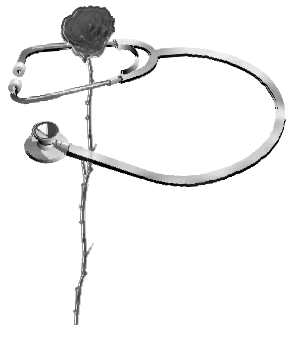|
|
|
 U.S.L.E
U.S.L.E 
![]()
Persons United Limiting Substandards and Errors in Health Care

PULSE
(Persons
United Limiting Substandards and Errors in Health Care)
is a non-profit
organization created for the purpose of educating the public about
errors in medicine, and to improve communications between doctors and patients.
PULSE of New Jersey is here to support the survivors of medical error and
substandard healthcare in the state of New Jersey.
Unfortunately, when things go wrong, the truth is usually the second victim of a medical error. We would like to bridge this gap. We feel that once the public is well-informed and takes an active role in their own healthcare, incidents of medical mistakes, negligence and malpractice will drop.
The Harvard Medical Study estimated that 80,000 to 300,000 die or are injured every year as a result of medical mistakes.
The AMA released
a report on October 27, 1997 that puts the figure even higher; at 3 million
in hospitals alone, at a cost of $200 billion dollars (American Medical
News, "Designing a Safer, Smarter Health Care System, AMA Foundation looks
at ways to prevent mistakes",). "The human cost of medical errors is high".
According to the Instutute of Medicine, November 29, 1999,
The
National Academies Office of News and PubliÉ medical errors kill
some 44,000 people in U.S. hospitals each year.
Another
study puts the number much higher, at 98,000. Even using the lower estimate,
more people die from medical mistakes each year than from highway accidents,
breast cancer, or AIDS. Far broader in scope, the initiative's
newest report, dated February 28, 2001 and released on March 1, 2001,
Crossing
the Quality Chasm: A New Health System for the 21st Century,
proposes
a comprehensive plan to address serious shortcomings in the health care
delivery system. You can read the full report online
at:
http://www.nap.edu/books/0309072808/html/
Preventing Medical Errors: A Call to Action reported by Maryann Napoli in January, 2000.
The statistics are alarming: In U.S. hospitals, between 44,000 and 98,000 people die each year due to medical errors. Even using the lower figure would make hospital medical errors the eighth leading cause of death, exceeding the number of people who die annually from highway accidents (43,458), breast cancer (42,297), or AIDS (16,516). The top figure (98,000) would move hospital errors to the country's fourth leading cause of death. As many as 3% of all hospital patients suffer injuries from treatment, half of which are preventable.
That we have a serious problem is not news. The first comprehensive study to document the prevalence of medical errors and resulting injuries was conducted by the Harvard School of Public Health and was published in 1991. What's new are the proposals for change now emanating from the National Academy of Sciences. Last month, the Academy's Institute of Medicine issued a report describing the magnitude of the problem and suggestions for improving safety.
Chief among
them is mandated reporting of all serious medical errors to state governments.
States would, in turn, report summary data to a new federal center (to
be created by an act of Congress). Most important, the information would
be made public. Within days of the release of the Institute's new report,
entitled "To Err is Human: Building a Safer Health System," President Clinton
affirmed its import by instructing a task force to identify--within 60
days--ways to improve consumer protection. And Senator Edward Kennedy announced
that he would introduce legislation to follow through on the Institute's
proposals...
(More).
This website
has been developed to help you learn how to protect yourself and those
you love from "iatrogenic injury".
American
Iatrogenic Association
Iatrogenic
means medically caused injury suffered which results in the disability
or death of the victim.
When you
are injured by a medical professional, you have little or no recourse.
Quick
Facts on Medical Malpractice
Tort reforms,
severe limitation on amounts that can be recovered for medical injuries,
as well as fees that can be collected by consumer attorneys that handle
medical malpractice cases, have made it difficult to file civil lawsuits.
Your rights to bring suit in state court are further restricted if you receive your medical coverage through an HMO. Most HMO's insert "Mandatory Binding Arbitration" clauses in their boilerplate contracts. This means that any claim you may have against an HMO or an HMO provider will be decided in a private alternative dispute resolution system. The process is private and confidential and no record of the proceedings is made. This allows health plans to hide incidents of medical malpractice and negligence and prevents patients from validly evaluating the quality of the health care delivered by these organizations.
Even when you are fortunate enough to be able to bring your claim in state court and to find an attorney willing to take your case, any restitution you receive will likely never adequately compensate you for your losses.
Regulation of medicine leaves much to be desired due to the fact that the only agencies regulating doctors are underfunded and understaffed. When you suffer the effects of bad medicine, there is no turning back, your life will never be the same again. There are presently few answers to this dilemma. However, the first is to prevent such injuries through consumer education. Second, obviously is to push for reforms that protect patient and consumer interests and to turn back those laws that limit a patient's right to gain access to the courts and full compensation when injuries occur.
For that reason, PULSE has created this website. Here we will teach you how to protect yourself and your family by checking on your doctor, hospital or other facility; how to effectively communicate with your provider and know your rights as a consumer of medicine.
It is very important for you to trust your primary physician and his judgment; however, we must not trust blindly. Today physicians owe their loyalty not to patients, but to those that can assure access to patients, the insurance industry. Most physicians are routinely required to make a choice between endangering their own livelihood and providing the patient the care they need. Many physicians are unwilling to risk their livelihood in order to buck the system for a patient. If physicians don't "toe the line"as demanded by their true employer, the insurance industry, they can be "fired". Their contracts with the HMO's will be canceled. This fact of life means that patients often do not get the care they want or need if the insurance industry says no.
However, the old adage that "the squeaky wheel gets the grease" is literally one to live by in today's healthcare system. Patient's must be their own best advocates and not allow their needs to be dismissed or marginalized. Here, only strong consumer's survive. If there is ever a conflict and you feel it is not resolved, find another physician at once. A reputable physician will not be threatened by an informed and assertive medical consumer.
Unfortunately, medicine is not perfect and many times things happen to people that cannot be helped. If you have an open and honest relationship with your doctor, he will be honest with you and you will understand everything that is going on. Hopefully, you will never experience "bad medicine" and the best way to avoid becoming a victim is to be an informed and assertive healthcare consumer.
There are three types of Iatrogenic injury:
1.Medical Mistakes: These things shouldn't happen, but they do. When you are the victim of a true mistake, you should be compensated and have what has happened explained to you. Most victims of medical mistakes are never compensated. Usually no action should be taken to discipline, although as a minimum, a review of the circumstances that allowed the mistake to happen should take place, and changes implemented so that a reoccurrence can be prevented.
2. Medical Negligence: These things happen much too often, either due to overworked caregivers, professionals who abuse drugs or alcohol, simple greed or carelessness. The victims of these types of negligent acts should be compensated and the perpetrators disciplined. Unfortunately, rarely is disciplinary action taken against medically negligent heathcare professionals. Seeing no consequences to their actions, they will often continue until the devastation they cause mounts until it can no longer be ignored by disciplinary authorities.
3. Criminal Medical Negligence: These things are reported in the media every day in American medicine and should be dealt with accordingly. However criminal charges against criminally responsible physicians or other healthcare professionals are very rare. These situations are some of the darkest in American medicine. Under this heading are acts such as physicians sexually assualting patients; performing unauthorized procedures; performing surgery or procedures under the influence of drugs or alcohol; abandoning patients in critical need of medical care; performing procedures in a reckless and unreasonable manner; some physicians have even been known to intentionally mutilate their patients. To add insult to the injuries that occur, the medical profession routinely undertakes efforts to "cover-up" when the "professional" attempts to hide the truth of their actions.
Although a very small percentage of care givers are such deviants, they are out there, and they are the most dangerous to you. Unfortunately, these deviants are permitted by the profession to continue to practice. They should be held accountable for their actions in the same manner any other criminal is, but they rarely are.
We will do everything that we can to educate you, the consumer of American medicine, about how to protect yourself and your loved ones. You are a consumer; you must look at healthcare the same way you look at any other service you employ. We have entered a new millennium, the age of managed care. Healthcare consumers must recognize that the decisions about your healthcare are no longer made just between you and your doctor, but instead, between your doctor, your insurance company or HMO, and finally you. We seek to rearrange that equation to put patients and consumer's first once again.
The baby boomers are going to be the largest group of seniors ever. We can no longer assume that someone else will take care of us. For the first time in history, when we become gravely ill, we are worth more to caregivers dead, than alive. We must protect ourselves now, and demand excellent care, and tolerate nothing less.
Be assertive;
demand what you need; its your life and health that's at stake.
Take
This To Your Doctor
If you are
not comfortable asking your physician "too" many questions
![]()
Please explore each section
of this website. Visit us often, and give us your
feedback.


All Links To P.U.L.S.E. New
Jersey
Sign
Our Guest Book & Message Board
.
Or
.
Try
Our Text & Auto Chat Rooms For Our P.U.L.S.E
Website
Viewers
Introduction Hippocratic Legal ArticlesCourt House Records Doctor-Patient Communication
How to File a Complaint Living Wills and Advanced Directives Rate Your Doctor HelpFul Links
Non-Consumer
Websites
_________________________________________________
Main P.U.L.S.E Website For All
States

This
website is continually being updated - Please remember to try us again
another time for more information!
There's
so much share!!
PULSE
does not offer legal or medical advice or referrals. Any information
on this website is for informational purposes only.
PULSE
takes no responsibility for the information in these websites.